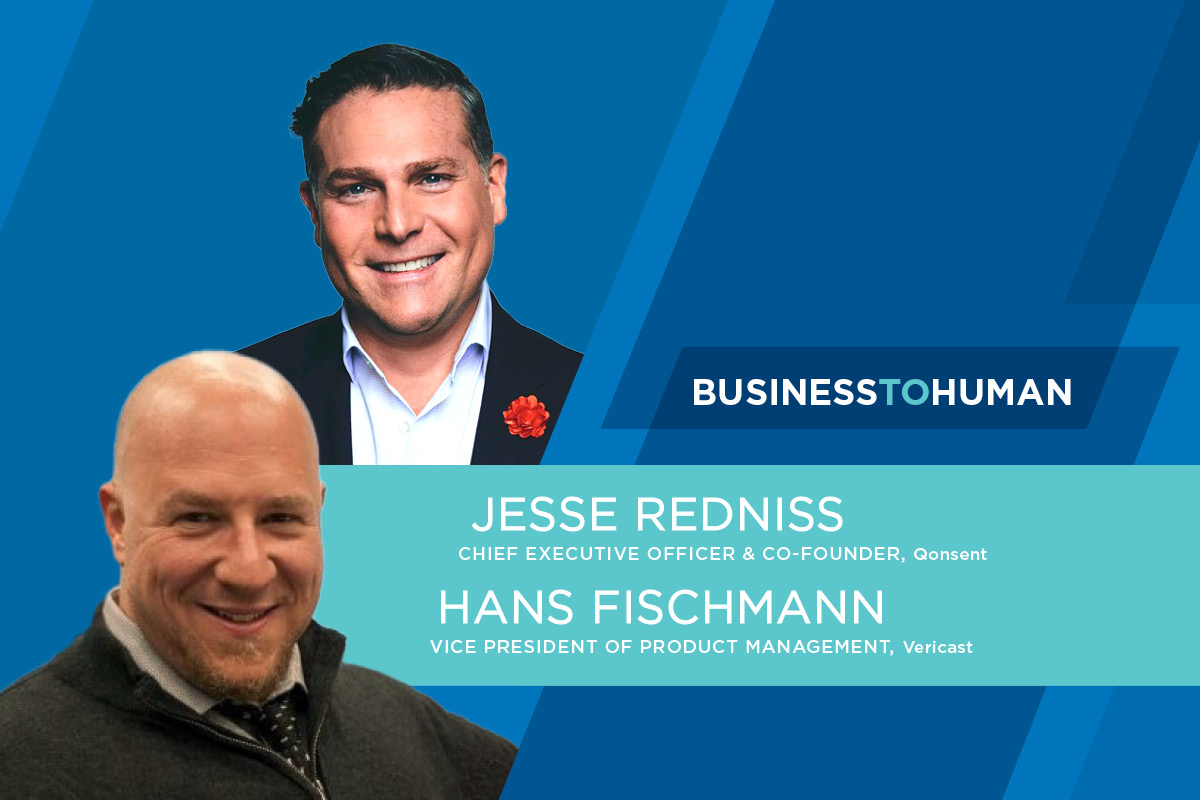In today’s ever-evolving marketing landscape, many professionals grapple with the intricacies of identity interoperability and the ethical gathering of personally identifiable information (PII). With regulatory boundaries still taking shape, compliance remains a moving target.
Marketers must make a steadfast commitment to compliance and transparency while prioritizing the trust they build with their customers. In this enlightening Business to Human podcast featuring Hans Fishman, Vice President of Product Management at Vericast, and Jesse Redniss, Chief Executive Officer and Co-Founder of Qonsent, we delve into the critical role of trust in data sharing.
Join us as we explore:
- The imperative of educating consumers on privacy and data usage.
- Opportunities that emerge in the realm of high-growth marketing.
- Upcoming deadlines associated with privacy legislation.
The Vital Connection: Empathy and Consumer Education in Privacy
At times, marketers fall prey to erroneous assumptions about privacy and data handling. Some rely on their privacy policies or legal teams to shield them, while others settle for minimal compliance that meets both legal requirements and consumer expectations.
According to Jesse, there’s a crucial missing piece, and it might surprise you.
“Privacy and consent are deeply intertwined with real people,” Jesse asserts. “It’s about fostering transparency, trust, and genuine human connections.”
Today, it’s no longer sufficient to treat data usage and privacy as purely legal or compliance matters. Marketers who resist or fail to adapt to current demands risk falling behind. The time has come to forge stronger connections with consumers, enthusiasts, and brand advocates. This foundation must be built upon trust and transparency. In the complex realm of data usage and privacy, consumer education stands as a linchpin.
Hans emphasizes, “We must prioritize reducing friction and putting consumers at the center of the experience. It’s not just a matter of user experience; it’s about presenting essential information upfront so consumers can make informed choices.”
As regulations like the California Privacy Rights Act (CPRA) are enforced and similar laws emerge, it becomes increasingly vital for marketers and organizations to comprehend the requirements and establish a robust foundation of trust with their consumers. Achieving this entails clear communication and education regarding the collection and utilization of consumer data, along with measures to ensure data privacy.
Pursuing High-Growth Marketing (and the Opportunities It Unveils)
In the realm of data, marketers, analysts, and business leaders find themselves inundated with a vast sea of information. In today’s digital age, immense volumes of isolated data are readily available. Regrettably, many are more preoccupied with the opportunities this data presents than with how it is ethically gathered. Given the mounting legal consequences and penalties, focusing on ethical data collection is no longer optional.
While some marketers may seek to avoid the time investment required for ethical data collection, Hans contends that the rewards will far surpass the demands. Moreover, these measures will soon become indispensable as enforcement tightens—delaying such efforts will do no favors to any organization or marketing team.
However, increased transparency and education concerning data usage also open doors to numerous possibilities in high-growth marketing. For instance, loyal fans or customers with a strong affinity for your business or product may be more inclined to share additional data in exchange for information or exclusive product releases.
Hans emphasizes, “The synergy of trust, access, and data information creates a significantly more profound and enduring consumer-brand relationship. It transcends a transactional bond.”
While data collection is often associated with digital experiences like website interactions, online shopping, and research, it can also wield substantial power in physical stores—an aspect often overlooked.
“We can invite consumers to join our loyalty program with a simple QR code scan at the point of purchase decision,” Hans explains. “This isn’t like a banner ad or CTV ad where consumers can’t react quickly enough. Here, consumers can make well-considered decisions, fostering relationships within the in-store environment.”
When consumers possess a clear understanding of how their data is collected, its purpose, and the benefits they gain from this exchange, they become more willing to share additional information. This, in turn, empowers marketers to allocate their time and resources more effectively, especially as identifying attribution becomes more challenging.
Jesse underscores, “The most crucial task for a marketer today is transitioning an anonymous audience into a known one. Without this clarity, gauging the effectiveness of different marketing efforts becomes a daunting task.”
Privacy Legislation: What Lies Ahead
While CPRA was enacted in 2020, we’ve only recently entered the phase of rigorous enforcement. As technology advances and data proliferates, personally identifiable information (PII) continues to expand beyond traditional notions.
“It’s no longer limited to just your name, phone number, home address, social security, and credit card details,” Jesse explains. “It now encompasses your IP address, device IDs—all the devices connected to you and your household.”
Even the smart devices we use contribute to this growing pool of PII. Presently, there are few established standards regarding these devices and the data they gather. Over time, initiatives will emerge to define interoperability standards, data handling, collection practices, and privacy protocols.
Hans anticipates that federal and state-level legislation may be closer than we think. Rather than awaiting these regulations and enforcement actions, which could disrupt business operations, he urges marketers and companies to proactively address these concerns.
“Fear of disruption is valid—it took us decades to compile our customer lists,” Hans acknowledges. “However, this very fear should drive us to act now and proactively tackle the challenges. The work done so far suggests that it’s not as daunting as it appears—it’s manageable.”
Do you want to dive deeper into the realms of data collection, privacy, and their impact on modern marketing? Tune in to our podcast on Apple Music®, Spotify®, or your preferred podcast platform.
